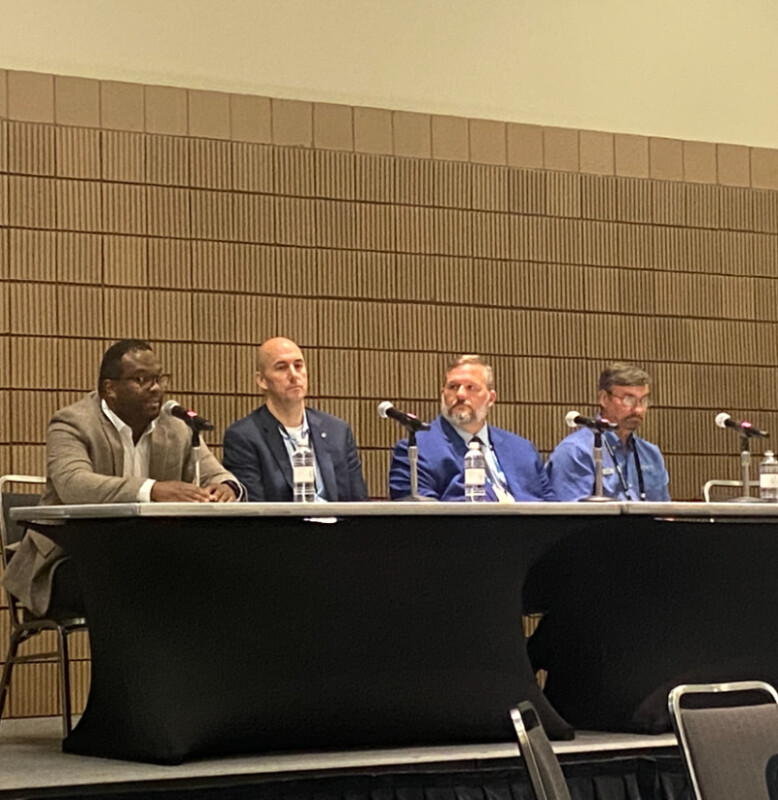For years, the commercial marine industry has been anticipating how new technologies will shape its future. From artificial intelligence and autonomous systems to new energy sources, evolving technologies are guiding the industry toward a future that is both promising and full of change. Today, however, it’s clear that the industry has entered a new, digital age.
That was the theme of a session held during the recent International WorkBoat Show, sponsored by Inmarsat Marine, entitled Thriving in the Digital Age: A Blueprint for Success. The two-hour seminar, in addition to providing lunch to attendees, included a wide-ranging panel discussion featuring industry insiders who are transitioning their own companies into the digital age, passing along insights for those looking to do the same.
The seminar was moderated by WorkBoat editorial director Jeremiah Karpowicz and included opening remarks from Eric Griffin, vice president, offshore energy and fishing with Inmarsat. In his introduction, Griffin discussed the current state of the industry and how technologies like the Internet of Things (IoT) and AI will shape its future. Following his remarks, the panel took the stage for the main discussion. In addition to Karpowicz, the panel featured Kyle Pemberton, manager of engineering, Seacor Marine LLC; Bo Jardine, advisory partner, 1852 Solutions LTD; Dain Detillier, executive VP, LNG operations, Harvey Gulf International Marine; and Ron Welles, c-comm manager, marine tech, Edison Chouest Offshore.
The conversation covered several key topics related to the digital transformation of the commercial marine sector, reflecting on the current state while also looking ahead to future needs. One of the most striking takeaways was the realization that digitalization is advancing so quickly that, in some cases, it's outpacing the industry's ability to keep up with the necessary knowledge.
“The biggest thing right now that I see is there's a huge emergence of digitalization that's been going on for the last 20 years, really, and it's at a rapid pace,” Detillier said. “I'm starting to see that humans are not keeping up with it. What I mean by that is that our knowledge, our capacity, as a whole, to understand what the usage for this technology can be used for is the real key problem out there.”
The panel agreed that while the new technology is valuable and many of its capabilities are essential for the industry, it's crucial for organizations to ensure their staff is properly trained. Additionally, the tools must be tailored to the specific needs of the industry. There’s little benefit in introducing these tools if workers don’t know how to use them or if they’re not accessible.
Welles shared an example of how he’s seen this issue play out in practice. He described how his organization brought in a “whole bunch of software engineers” to develop an IoT system, with the engineers having many ideas about the system’s design and direction. However, the final product didn’t align with the team’s needs or expectations.
“We brought in our chief engineer, who had worked on the vessel for three years or so, down to look at the screen, and he’s like, `I have no idea what I’m looking at,’" Welles said. “We have to go back and make something that people in the industry can look at and understand. One of the lessons that we learned is bringing things down to where people can understand and make some use of the data that’s coming in so we’re not just sitting there on top of 12 terabytes of data.”
Looking ahead, the panel had differing opinions on the best way to fully leverage the new technology and the data within the industry. However, there was broad agreement on one point: the importance of data sharing. While it's understandable that some organizations want to protect certain data, to maximize the potential of AI and other technologies in the sector, data sharing needs to be more widely accepted and embraced.
“I just want everyone to understand that we’re not there yet in terms of sharing data,” Pemberton told the audience. “A lot of players in the industry, they see their data as proprietary, and it is to that point where, when it comes down to sharing that data so we can advance, that discussion is ever-evolving.”
Pemberton gave an example from the offshore industry, where numerous operations involve many moving parts. He explained that sharing data in this context can help streamline processes and make operations run much more smoothly for everyone involved.
Disagreement arose, however, over the roles government and regulators should play in shaping the future of the industry. Focusing on data sharing, Pemberton sees regulation playing a key role in its evolution.
“I think there’s a big hurdle that we need to overcome, which is the standardization. That’s something that has to be in place, and it can only be driven by regulations for us to really start working with one dataset or framework to actually start getting data. The shore side may have a different way of interpreting data from the vessels, and that’s when it has caused confusion,” Pemberton said.
From Detillier’s perspective, particularly when it comes to decarbonization strategies, government-driven regulation needs to play a significant role.
“I think when you come to decarbonization, though, and you try to reduce emissions, you have to have regulatory [measures], because no one is going to spend more money to decarbonize. That’s just the fact of capitalism, right?”
Jardine, however, pushed back on the idea of needing greater regulation, telling the panel to “be careful what you ask for” with regard to governmental intervention. He warned of governments coming into areas in which they are not experts and writing standards that can’t actually be adopted. Instead, he is hoping for a disruptor to set a new path forward.
“I think what’s probably another alternative is somebody who comes in and shakes up the model and does it differently. If you look at other industries, you shake them up by an outside [player] coming in and changing the whole paradigm within the industry. I’m just going to say, opportunity knocking, if you come in and come up with a better mousetrap, everybody will adopt the mousetrap.”
Ultimately, while the panel disagreed on the exact path the industry should take, there was little doubt that change is inevitable. The industry is evolving, and it's crucial for everyone to start thinking about how they will thrive in this new digital age.





